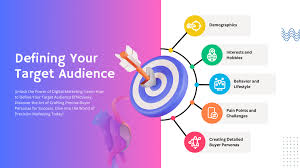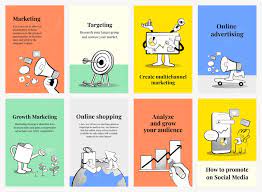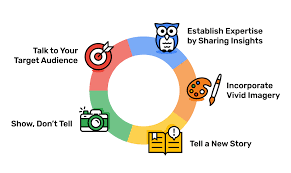Unlocking Success: Target Audience Strategies in Digital Marketing
Understanding the Importance of Target Audience in Digital Marketing
In the realm of digital marketing, identifying and understanding your target audience is crucial for success. Your target audience represents the specific group of individuals who are most likely to be interested in your products or services. By tailoring your marketing efforts to cater to this audience, you can significantly improve the effectiveness of your campaigns.
One of the key benefits of defining your target audience is the ability to create more relevant and engaging content. When you have a clear understanding of who your audience is, you can tailor your messaging, tone, and imagery to resonate with their preferences and interests. This personalisation can help establish a stronger connection with your audience and increase engagement.
Furthermore, targeting specific audience segments allows you to allocate your resources more efficiently. By focusing your marketing efforts on those most likely to convert, you can maximise the impact of your budget and achieve a higher return on investment. This targeted approach helps you avoid wasting resources on reaching audiences that are unlikely to be interested in your offerings.
Understanding your target audience also enables you to gather valuable insights that can inform future marketing strategies. By analysing data related to your audience’s demographics, behaviours, and preferences, you can refine your targeting parameters and optimise your campaigns for better results. This data-driven approach empowers you to make informed decisions that drive business growth.
In today’s digital landscape, where competition is fierce and attention spans are limited, knowing your target audience is essential for standing out from the crowd. By delivering personalised experiences that resonate with their needs and desires, you can build brand loyalty and foster long-term relationships with customers.
Ultimately, by prioritising your target audience in digital marketing efforts, you can enhance the effectiveness of your campaigns, improve customer engagement, and drive business growth in a competitive online environment.
Understanding and Engaging Your Target Audience: Key Insights for Digital Marketing Success
- 1. How important is defining a target audience in digital marketing?
- 2. What methods can be used to identify a target audience for digital marketing campaigns?
- 3. Why is understanding the demographics of a target audience crucial in digital marketing?
- 4. How can businesses tailor their content to appeal to different segments of their target audience?
- 5. What role does data analytics play in targeting and reaching the right audience in digital marketing?
- 6. How can businesses ensure that their messaging resonates with their target audience across various digital channels?
- 7. What are the benefits of conducting market research to better understand a target audience in digital marketing?
- 8. How can businesses measure the effectiveness of their targeting strategies and adjust them accordingly?
1. How important is defining a target audience in digital marketing?
Defining a target audience in digital marketing is paramount to the success of any campaign. It serves as the foundation upon which all marketing strategies are built, guiding decisions on messaging, content creation, channel selection, and budget allocation. By identifying and understanding the specific demographics, behaviours, and preferences of your target audience, you can tailor your efforts to effectively reach and engage those most likely to convert. This targeted approach not only improves the efficiency of your marketing efforts but also enhances the overall impact of your campaigns by delivering relevant and personalised experiences that resonate with your audience. In essence, defining a target audience in digital marketing is not just important—it is essential for driving meaningful results and achieving business objectives in the competitive online landscape.
2. What methods can be used to identify a target audience for digital marketing campaigns?
In digital marketing, there are several methods that can be employed to identify a target audience for campaigns. One common approach is conducting market research to gather data on demographics, behaviours, and preferences of potential customers. This information can help create detailed buyer personas that represent different segments of the target audience. Additionally, analysing website analytics and social media insights can provide valuable insights into the characteristics and online activities of your audience. Utilising tools such as customer surveys, focus groups, and competitor analysis can also aid in refining the target audience profile and tailoring marketing strategies to effectively reach and engage with the right people.
3. Why is understanding the demographics of a target audience crucial in digital marketing?
Understanding the demographics of a target audience is crucial in digital marketing because it provides valuable insights into the characteristics, preferences, and behaviours of the individuals you are trying to reach. By knowing the age, gender, location, income level, interests, and other demographic factors of your target audience, you can tailor your marketing strategies to resonate with their specific needs and desires. This personalised approach enables you to create content that is more relevant and engaging, ultimately increasing the likelihood of capturing their attention and driving conversions. Additionally, demographic data allows you to segment your audience effectively, delivering targeted messages to different groups based on their unique profiles. Overall, by understanding the demographics of your target audience, you can enhance the effectiveness of your digital marketing efforts and achieve better results.
4. How can businesses tailor their content to appeal to different segments of their target audience?
Businesses can tailor their content to appeal to different segments of their target audience by first gaining a deep understanding of the unique characteristics, preferences, and behaviours of each segment. By conducting thorough market research and leveraging data analytics, businesses can identify the specific needs and interests of each audience segment. With this knowledge in hand, they can create targeted content that speaks directly to the concerns and desires of each group. This may involve customising messaging, tone, visuals, and even the choice of channels used to deliver the content. By personalising their approach in this way, businesses can establish stronger connections with diverse segments of their target audience and drive engagement and conversions effectively.
5. What role does data analytics play in targeting and reaching the right audience in digital marketing?
Data analytics plays a pivotal role in targeting and reaching the right audience in digital marketing. By leveraging data analytics tools and techniques, businesses can gain valuable insights into consumer behaviour, preferences, and trends. This data allows marketers to segment their target audience more effectively, identify key demographics, and tailor their marketing strategies to resonate with specific audience segments. Data analytics also enables marketers to track the performance of their campaigns in real-time, measure key metrics such as engagement and conversion rates, and make data-driven decisions to optimise their targeting efforts. In essence, data analytics empowers businesses to refine their approach, enhance personalisation, and maximise the impact of their digital marketing initiatives for better results.
6. How can businesses ensure that their messaging resonates with their target audience across various digital channels?
To ensure that their messaging resonates with their target audience across various digital channels, businesses can employ a multi-faceted approach. Firstly, conducting thorough audience research to understand their demographics, preferences, and online behaviour is crucial. This data-driven insight can help tailor messaging to align with audience interests and needs. Secondly, creating consistent branding and messaging across all digital channels can reinforce brand identity and build trust with the audience. Utilising analytics tools to track engagement metrics and feedback can also provide valuable information for refining messaging strategies to better resonate with the target audience. Lastly, regularly testing and optimising content based on audience response and market trends can ensure that businesses stay relevant and engaging in the ever-evolving digital landscape.
7. What are the benefits of conducting market research to better understand a target audience in digital marketing?
Conducting market research to better understand a target audience in digital marketing offers a multitude of benefits. By delving into market research, businesses can gain valuable insights into their audience’s demographics, preferences, behaviours, and needs. This in-depth understanding allows for the creation of more targeted and personalised marketing campaigns that resonate with the audience on a deeper level. Market research also helps businesses identify emerging trends, anticipate changes in consumer behaviour, and stay ahead of the competition. Ultimately, investing time and resources in market research can lead to improved campaign performance, higher engagement rates, increased conversions, and long-term customer loyalty in the dynamic landscape of digital marketing.
8. How can businesses measure the effectiveness of their targeting strategies and adjust them accordingly?
Businesses can measure the effectiveness of their targeting strategies in digital marketing by analysing key performance indicators (KPIs) such as conversion rates, click-through rates, engagement metrics, and return on investment (ROI). By tracking these metrics, businesses can evaluate the success of their campaigns in reaching and resonating with their target audience. Additionally, conducting A/B testing and gathering feedback through surveys or customer interactions can provide valuable insights into the effectiveness of targeting strategies. Based on these findings, businesses can adjust their targeting parameters, messaging, and tactics to optimise their campaigns for better results and continued success in engaging with their desired audience.





